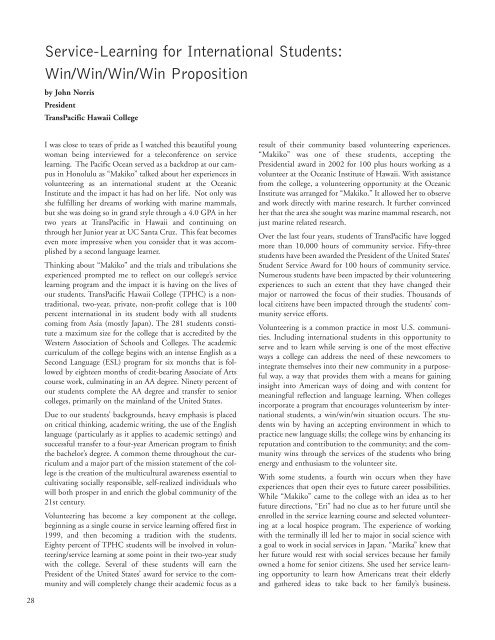Impact of Education Abroad on Career Development, Vol I - AIFS
Impact of Education Abroad on Career Development, Vol I - AIFS
Impact of Education Abroad on Career Development, Vol I - AIFS
You also want an ePaper? Increase the reach of your titles
YUMPU automatically turns print PDFs into web optimized ePapers that Google loves.
Service-Learning for Internati<strong>on</strong>al Students:Win/Win/Win/Win Propositi<strong>on</strong>by John NorrisPresidentTransPacific Hawaii CollegeI was close to tears <str<strong>on</strong>g>of</str<strong>on</strong>g> pride as I watched this beautiful youngwoman being interviewed for a telec<strong>on</strong>ference <strong>on</strong> servicelearning. The Pacific Ocean served as a backdrop at our campusin H<strong>on</strong>olulu as “Makiko” talked about her experiences involunteering as an internati<strong>on</strong>al student at the OceanicInstitute and the impact it has had <strong>on</strong> her life. Not <strong>on</strong>ly wasshe fulfilling her dreams <str<strong>on</strong>g>of</str<strong>on</strong>g> working with marine mammals,but she was doing so in grand style through a 4.0 GPA in hertwo years at TransPacific in Hawaii and c<strong>on</strong>tinuing <strong>on</strong>through her Junior year at UC Santa Cruz. This feat becomeseven more impressive when you c<strong>on</strong>sider that it was accomplishedby a sec<strong>on</strong>d language learner.Thinking about “Makiko” and the trials and tribulati<strong>on</strong>s sheexperienced prompted me to reflect <strong>on</strong> our college’s servicelearning program and the impact it is having <strong>on</strong> the lives <str<strong>on</strong>g>of</str<strong>on</strong>g>our students. TransPacific Hawaii College (TPHC) is a n<strong>on</strong>traditi<strong>on</strong>al,two-year, private, n<strong>on</strong>-pr<str<strong>on</strong>g>of</str<strong>on</strong>g>it college that is 100percent internati<strong>on</strong>al in its student body with all studentscoming from Asia (mostly Japan). The 281 students c<strong>on</strong>stitutea maximum size for the college that is accredited by theWestern Associati<strong>on</strong> <str<strong>on</strong>g>of</str<strong>on</strong>g> Schools and Colleges. The academiccurriculum <str<strong>on</strong>g>of</str<strong>on</strong>g> the college begins with an intense English as aSec<strong>on</strong>d Language (ESL) program for six m<strong>on</strong>ths that is followedby eighteen m<strong>on</strong>ths <str<strong>on</strong>g>of</str<strong>on</strong>g> credit-bearing Associate <str<strong>on</strong>g>of</str<strong>on</strong>g> Artscourse work, culminating in an AA degree. Ninety percent <str<strong>on</strong>g>of</str<strong>on</strong>g>our students complete the AA degree and transfer to seniorcolleges, primarily <strong>on</strong> the mainland <str<strong>on</strong>g>of</str<strong>on</strong>g> the United States.Due to our students’ backgrounds, heavy emphasis is placed<strong>on</strong> critical thinking, academic writing, the use <str<strong>on</strong>g>of</str<strong>on</strong>g> the Englishlanguage (particularly as it applies to academic settings) andsuccessful transfer to a four-year American program to finishthe bachelor’s degree. A comm<strong>on</strong> theme throughout the curriculumand a major part <str<strong>on</strong>g>of</str<strong>on</strong>g> the missi<strong>on</strong> statement <str<strong>on</strong>g>of</str<strong>on</strong>g> the collegeis the creati<strong>on</strong> <str<strong>on</strong>g>of</str<strong>on</strong>g> the multicultural awareness essential tocultivating socially resp<strong>on</strong>sible, self-realized individuals whowill both prosper in and enrich the global community <str<strong>on</strong>g>of</str<strong>on</strong>g> the21st century.<strong>Vol</strong>unteering has become a key comp<strong>on</strong>ent at the college,beginning as a single course in service learning <str<strong>on</strong>g>of</str<strong>on</strong>g>fered first in1999, and then becoming a traditi<strong>on</strong> with the students.Eighty percent <str<strong>on</strong>g>of</str<strong>on</strong>g> TPHC students will be involved in volunteering/servicelearning at some point in their two-year studywith the college. Several <str<strong>on</strong>g>of</str<strong>on</strong>g> these students will earn thePresident <str<strong>on</strong>g>of</str<strong>on</strong>g> the United States’ award for service to the communityand will completely change their academic focus as aresult <str<strong>on</strong>g>of</str<strong>on</strong>g> their community based volunteering experiences.“Makiko” was <strong>on</strong>e <str<strong>on</strong>g>of</str<strong>on</strong>g> these students, accepting thePresidential award in 2002 for 100 plus hours working as avolunteer at the Oceanic Institute <str<strong>on</strong>g>of</str<strong>on</strong>g> Hawaii. With assistancefrom the college, a volunteering opportunity at the OceanicInstitute was arranged for “Makiko.” It allowed her to observeand work directly with marine research. It further c<strong>on</strong>vincedher that the area she sought was marine mammal research, notjust marine related research.Over the last four years, students <str<strong>on</strong>g>of</str<strong>on</strong>g> TransPacific have loggedmore than 10,000 hours <str<strong>on</strong>g>of</str<strong>on</strong>g> community service. Fifty-threestudents have been awarded the President <str<strong>on</strong>g>of</str<strong>on</strong>g> the United States’Student Service Award for 100 hours <str<strong>on</strong>g>of</str<strong>on</strong>g> community service.Numerous students have been impacted by their volunteeringexperiences to such an extent that they have changed theirmajor or narrowed the focus <str<strong>on</strong>g>of</str<strong>on</strong>g> their studies. Thousands <str<strong>on</strong>g>of</str<strong>on</strong>g>local citizens have been impacted through the students’ communityservice efforts.<strong>Vol</strong>unteering is a comm<strong>on</strong> practice in most U.S. communities.Including internati<strong>on</strong>al students in this opportunity toserve and to learn while serving is <strong>on</strong>e <str<strong>on</strong>g>of</str<strong>on</strong>g> the most effectiveways a college can address the need <str<strong>on</strong>g>of</str<strong>on</strong>g> these newcomers tointegrate themselves into their new community in a purposefulway, a way that provides them with a means for gaininginsight into American ways <str<strong>on</strong>g>of</str<strong>on</strong>g> doing and with c<strong>on</strong>tent formeaningful reflecti<strong>on</strong> and language learning. When collegesincorporate a program that encourages volunteerism by internati<strong>on</strong>alstudents, a win/win/win situati<strong>on</strong> occurs. The studentswin by having an accepting envir<strong>on</strong>ment in which topractice new language skills; the college wins by enhancing itsreputati<strong>on</strong> and c<strong>on</strong>tributi<strong>on</strong> to the community; and the communitywins through the services <str<strong>on</strong>g>of</str<strong>on</strong>g> the students who bringenergy and enthusiasm to the volunteer site.With some students, a fourth win occurs when they haveexperiences that open their eyes to future career possibilities.While “Makiko” came to the college with an idea as to herfuture directi<strong>on</strong>s, “Eri” had no clue as to her future until sheenrolled in the service learning course and selected volunteeringat a local hospice program. The experience <str<strong>on</strong>g>of</str<strong>on</strong>g> workingwith the terminally ill led her to major in social science witha goal to work in social services in Japan. “Marika” knew thather future would rest with social services because her familyowned a home for senior citizens. She used her service learningopportunity to learn how Americans treat their elderlyand gathered ideas to take back to her family’s business.28


